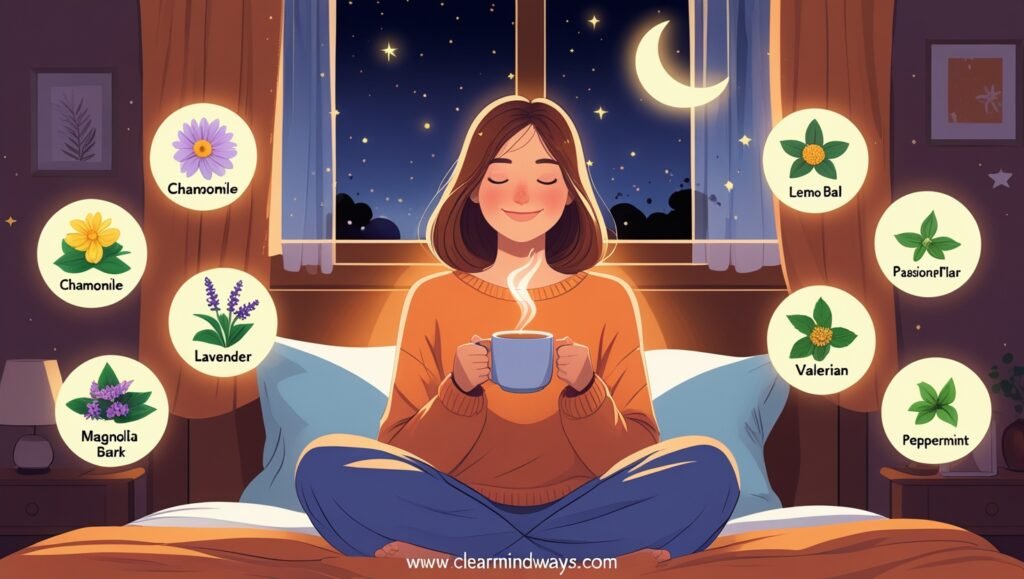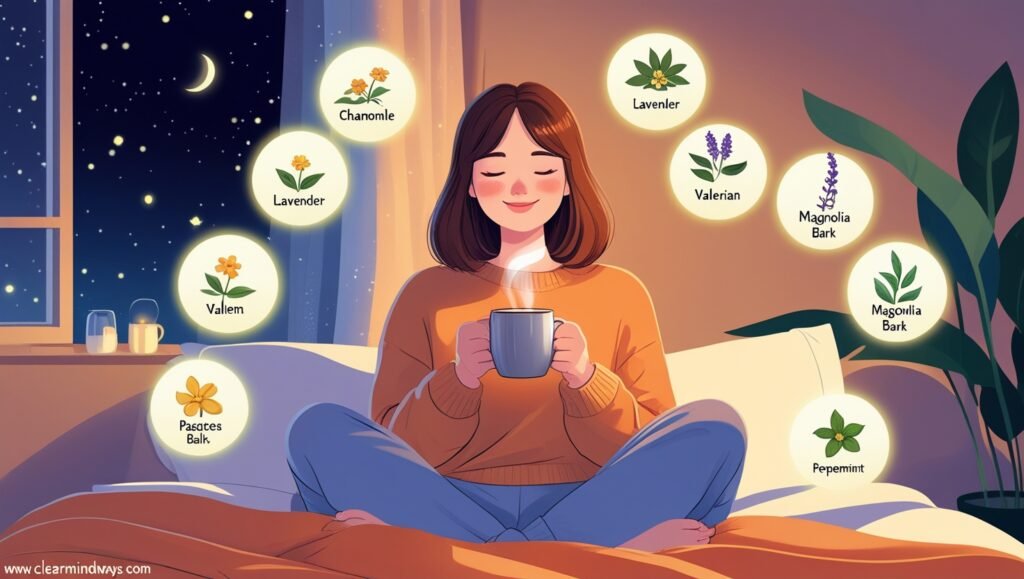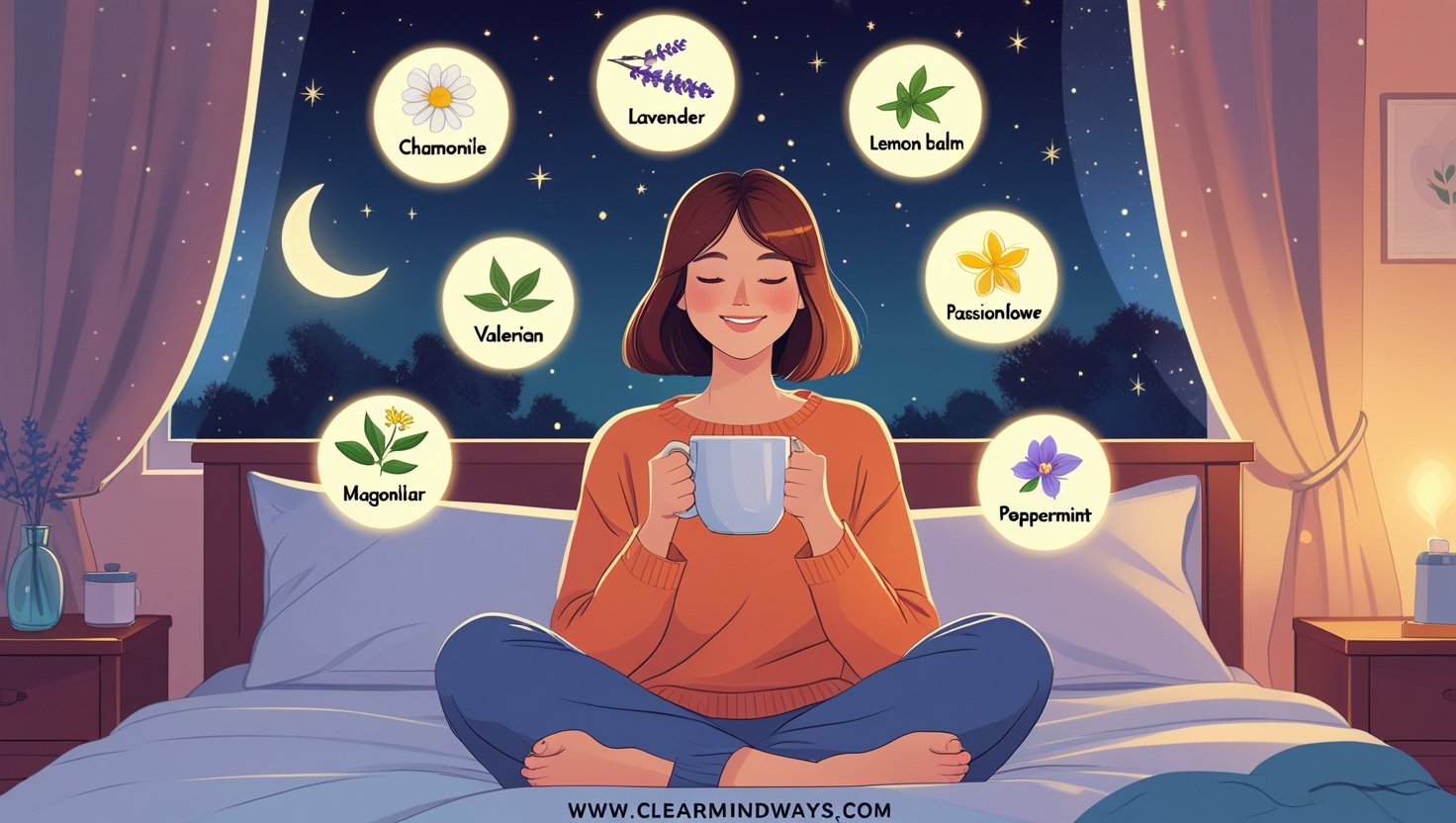Can’t fall asleep at night? You’re not alone. It’s estimated that millions of adults deal with their own sleep issues each night. Society’s mental race, stress and busy schedules have made it difficult to slow down when it’s time to go to sleep.
The good news is, bedtime teas provide a natural answer that has been helping people sleep better for thousands of years. These mild herbal supplements are designed to work with your body’s natural sleep cycle. They are also non-habit-forming, unlike sleeping pills.
The right bedtime tea can make a difference in your evening routine. You’ll nod off peacefully rather than fidgeting. Quality sleep enhances mood, energy and health. The 7 Best Tea To Help You Sleep And Sleep Like A Baby What are the 7 best bedtime teas you can use to guarantee you get a restful sleep?.
Benefits of a Cup of Tea Before Bed
Having tea before bed does more than help keep you warm. The ritual itself sends a message to your brain that it’s time to relax. And this single act forms a mental connection between your hectic day and a restful night.
Sleep experts say that chamomile, lavender and valerian root teas might provide a shorter path to dreamland. These teas also have natural ingredients that calm you without adverse effects.
Here’s what’s going down inside you when you sip bedtime tea:
The heat from the warm liquid raises your body temperature a bit. As you wind down after, this is akin to your body’s natural sleep process. The decrease in temperature tells your brain to release sleep hormones.
The brewing process also matters. When you take the time to prepare a cup of tea, it becomes a moment of mindfulness. This is breaking the pattern of hurrying from task to task. Your nervous system has an opportunity to settle into rest.
Bedtime teas are often made with antioxidants that will benefit your health as a whole. They help your body to repair itself when you sleep. They also curb inflammation that can disrupt restorative sleep.
People who drink tea on a regular basis say they sleep better. They fall asleep more quickly and wake up less at night. The regular schedule teaches your brain to associate certain cues with sleep.
Unlike cups of coffee, herbal teas won’t keep you awake. The majority of bedtime teas are caffeine-free by nature. This means they are great for taking in the evening and not worrying about your sleep pattern.
Top 7 Bedtime Teas for Better Sleep
All bedtime teas are not created equal. And every model has unique benefits for different sleep problems. Some help with the reduction of anxiety, while others work to induce physical relaxation.
The following seven teas are the ones with the most solid scientific evidence behind them for helping you to sleep. They have been used safely for centuries, and today they continue to help people to sleep better.

Chamomile Tea
Chamomile is the number 1 bedtime tea in the world. This delicate flower has apigenin, a substance that latches onto brain receptors and helps turn on sleepiness. Chamomile tea is known to have calming effects that can help put the mind at ease and prevent you from waking up multiple times during the night.
Studies have indicated chamomile tea helps people drift off to sleep more quickly. It also enhances the quality of sleep and cuts nighttime awakenings. Everyone likes it because it has a kind of honey taste.
Chamomile is best for people whose sleep problems stem from anxiety or stress. The apigenin serves as a natural sedative. It quiets the mind and lowers physical tension.
Drinking chamomile tea every day has no side effects. It is soft enough to use daily. It is a favorite option for many because it works best when you take it 30-45 minutes before you go to sleep.
Get good chamomile that is made of whole flowers. Don’t buy into added caffeine or artificial ingredients. Organic is doubly good, since you’re not ingesting any pesticides that may disrupt your sleep.
Related: 100 Positive Affirmations for Stress and Anxiety Relief
Lavender Tea
It is one of the most unique and soothing scent that comes from lavender tea. In a different study, tea made with lavender helped lower anxiety and depression levels in elderly participants. Participants in the experimental group drank the lav- ender tea by using a 2-g tea bag in the morning and night for 2 weeks.
The active ingredients in lavender flowers are linalool and linalyl acetate. Such compounds were found to have an anxilolytic effect. Even the scent of lavender tea as you make it can help initiate the relaxation.
Lavender tea is one of those that has a real flowery taste that some people are going to love right away. For others, it can take a long time to develop the taste. Mixing in lavender with more mild herbs such as chamomile results in a mellower flavor.
Just the aroma of lavender alone leads to better sleep. Lavender aromatherapy has been shown to decrease sleep disturbance. It offers both internal and aromatherapy benefits, café-style.
Begin with a lighter brew if you’re new to lavender tea. Add more strength as you acclimate to the taste. Both the best tasting and – flowering and best:scented for tea making is French lavender (Lavandula angustifolia).
Valerian Root Tea
Valerian root tea is known to be one of the most powerful herbal sleep supplements. Studies show that valerian root can shorten the amount of time it takes to fall asleep and improve the quality and quantity of sleep.
This potent little herb has been used for sleep problems for more than 2,000 years. The active ingredients act on brain chemicals that promote sleepiness. Valerian raises your GABA levels, which slows down your brain.
The smell of valerian root tea is very earthy with most people not liking it in the beginning. The flavour is heavy as well, a little bitter. A lot of people mix it with sweet herbs just to make it taste better.
The effects of the tea are usually felt 30 to 60 minutes after consumption. This brings us to timing — you should only drink it when you are ready for bed. The drowsiness can be quite marked.
Valerian is more effective for mild sleep issues than for serious long-term insomnia. It’s not for daily use over long periods as a sleep aid. If you take medications, be sure to consult a healthcare provider before using valerian; it may interact with some medications.
Lemon Balm Tea
Lemon balm tea is a deliciously tangy tea with mild sedative effects. This member of the mint family has been employed since medieval times to alleviate stress and ensure sound sleep.
The leaves are filled with rosmarinic acid and flavonoids to aid in soothing the nervous system. A study published in the Mediterranean Journal of Nutrition and Metabolism found that lemon balm extract can increase sleep quality and help reduce symptoms of insomnia.
With a gentle, cooling flavor, lemon balm is among the more palatable of the bedtime teas. There are no sweeteners or flavor enhancers. Sipping it as part of an evening routine is a favorite for me and many others.
Traditional Medicinals combined valerian with other sleep-supportive herbs such as passionflower, lemon balm and peppermint to help you snooze easy. This demonstrates that lemon balm amplifies other sleep-inducing herbs.
The tea is also beneficial for settling digestion, which can affect sleep. Lemon balm calms upset stomach and reduces gas. If you drink a glass after dinner, it can help cut down on nighttime digestive trouble.
You need fresh or dried lemon balm leaves. The most full-flavored tea is made with fresh leaves from your garden. The tea won’t get bitter even if you brew it too long.
Passionflower Tea
Passionflower tea has become one of the top remedies for sleep problems caused by anxiety. According to a study in Phytotherapy Research, passionflower could be linked to longer periods of overall sleep and a reduction in insomnia in individuals.
This lovely climber has chrysin and vitexin flowers. Anxiety-Reducing Properties these chemicals also have been shown to reduce anxiety. Passionflower is an anxiety buster and mood elevator. Passionflower hops Passionflower hops are a great way to lower anxiety and decrease insomnia naturally, helping you fall asleep.
It’s a mild taste, with a faint grassy quality. It Is compatible with multiple Herbs, It does not overpower tea blends. Passionflower is a common ingredient in many commercial bedtime teas.
1) Passionflower Passionflower is an ideal remedy for those whose sleep problems result from worry, or an inability to stop the mind from racing. It raises GABA levels in the brain, which in turn dampens overactive thoughts.
Side effects tend to be mild and gradual. You don’t go to sleep at once; you gradually settle into a state of relative calm. It’s great for unwinding slowly throughout the evening.
Peppermint Tea
We use peppermint tea as a refreshing nightcap. Although mint sounds invigorating, peppermint tea discourages poor sleep in that it treats the physical symptoms that prevent you from sleeping.
The menthol in peppermint leaves relaxes muscles and calms digestive complaints. This may remove frequent causes of night time restlessness. And the cooling can be beneficial for people who experience hot flashes or night sweats.
Peppermint tea is naturally caffeine-free. The refreshing taste means it’s also a hit with people who are not a fan of overly floral teas. The taste is clean and crisp, and can be especially calming at bedtime.
The digestive properties of peppermint tea provide relief for those who suffer from stomach problems at night. It relieves gas, bloating and mild upset stomach. The fridge-guarded water will help stave off these troubles while still allowing you to sleep.
The best tasting tea comes from peppermint’s leaves. But dried peppermint is equally good. You may want to play with steep time according to how minty you like it.
Low-Caffeine Green Tea
Green tea low in caffeine offers a special choice for tea lovers who wish to cut down on stimulants before start working and at night. Some of the tea, such as regular green tea, has relatively high caffeine content; other versions processed in specific ways actually lower the stimulant content while maintaining many compounds that are good for you.
Green tea has L-theanine which is an amino acid; known to induce relaxation without sleepiness. This compound, in conjunction with small doses of caffeine, promotes calm alertness, before slowly moving into tiredness.
The antioxidants in green tea have a positive effect on health and can enhance the quality of sleep. Olive oil compounds like these help reduce inflammation and oxidative stress that can disrupt restful sleep.
Select only those labeled as low-caffeine or decaffeinated. Japanese green teas such as sencha are naturally lower in caffeine than Chinese ones. These then are the better choices to eat at night.
Green tea requires proper preparation. Steep for less time in cooler water, about 175°F. This decreases the caffeine extraction and protects healthy elements.
Related: The 9 Best Natural Remedies for Anxiety
Tips for Brewing Bedtime Teas

Great bedtime tea is a combination of brewing process and preparation ritual. How you are brewing your tea can also determine how effective it will be for you, in addition to if you actually enjoy the routine or not.
Temperature of water is very important in the process of extracting good compounds out of it. Tender blossoms, such as chamomile and lavender, require water that’s just below boiling (200°F). More robust herbs, like valerian root, will strip even in full boiling water. Green tea calls for cooler water somewhere around 175°F to avoid bitterness.
Use filtered water when possible. Chlorine and minerals inside tap water can affect subtle herb flavors. Get the best night’s sleep with fresh, pure water as the base for your bedtime tea.
Steep times for the following herbs will be different:
- Camomile and lemon balm: 5-10 minutes
- Lavender: 4-6 minutes
- Valerian root: 3-5 minutes
- Passionflower: 5-8 minutes
- Peppermint: 3-5 minutes
- Green tea: 2-3 minutes
Cover your tea while steeping. This keeps the good oils in the steam rather than out the lid. Dose: one teaspoon dried/one tablespoon fresh herb per cup water.
Glass or ceramic brewing vessels are best. Metal containers can affect flavor. Tea infusers give loose herbs space to expand and release even more of their good stuff than tightly packed bags of tea.
When you do your bedtime ritual matters, too. Steep tea 30-60 minutes before you want to go to sleep. This allows a little time for things to start while serving as another Incremental Activity.
Keep your dried herbs in sealed containers, away from light and heat. It keeps them both potent, and flavorful. Although the fresh herbs may be stored in the refrigerator for a few days, they can also be dried for longer storage.
A Good Night’s Sleep is a Sip Away
The road to better sleep in bedtime teas is a more subtle, natural means of sleeping. Unlike pharmaceutical sleep aids, these herbal teas work with your body’s systems, not against them.
A good, reliable bedtime tea ritual can help keep your sleep schedule in line. As you drink the same tea each night, at the same time, your brain learns that these signals mean it’s time to go to sleep. This makes falling asleep it sounds so much more natural.
Making tea is a valuable screen-free evening ritual. In our digital age, this provides a convenient buffer between daytime activity and sleep. Your brain has a chance to sift the day’s events and let go of pent-up stress.
Individual responses vary significantly. Gentle herbs like chamomile work better for some. Others require stronger choices like valerian root. By keeping a sleep journal, you can record which teas are most effective for your individual needs.
The advantages are more than just falling asleep more quickly. Frequent bedtime tea sippers might notice an improvement in the quality and restorative nature of their sleep. They sleep longer and wake up more refreshed.
It is crucial to be using safe bedtime teas if you are drinking them consistently! Some herbs are safe for most people ― but they might interact with other medications. Pregnant women and those with medical conditions should check with health care providers before regular use.
Lingering environmental and economic benefits make bedtime teas long-term darlings. With homegrown or organic, you can support sustainable practices. Usually much cheaper than prescription sleep medications.
Sleep quality is linked to every dimension of health. Bad sleep is not only tied to immune function but also to mental state, weight and cognitive function. Opting for natural methods such as bedtime teas ensures longterm health without enduring the negative impacts of pharmaceutical medications.
The seven sleep time teas on this list approach the same destination from different paths: the goal is to support the restful hours you spend asleep. Whether you opt for soothing chamomile, fragrant lavender or strong valerian root, you are one step closer to good sleep health.
Good sleep hygiene is more than sipping tea, remember. Establish a cool, dark, soundless sleep zone. Maintain consistent sleep schedules. Avoid stimulating activities before bedtime. Bedtime teas are most effective when used as part of a holistic approach to developing healthy sleep habits.
Your sleep-improvement journey though bedtime teas is a personal and a customized experience. Begin with one tea that speaks to you. Just pay attention to your body. Adapt timing, strength and styles based on your results.
Sweet dreams are made in your teacup. The perfect night time tea to help lull you to sleep and ease you into your day. Try this easy, organic fix tonight – your body and mind will thank you for embracing this gentle, natural route to better sleep.
